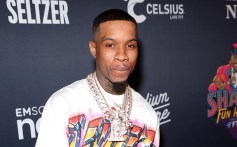Business
Page: 6

Trending on Billboard
Imogen Heap has always been known as an innovator in the music industry. The British singer, songwriter, producer and technologist has been experimenting with cutting edge tools to push her creativity forward since she first began releasing music over 25 years ago.
Now, as AI music continues to make headlines in the music industry and infiltrates the songwriting process, Heap is working on ethical ways to incorporate it into her own work. Recently, she released the song “I AM___,” a 13-minute epic that featured a collaboration between Heap and AI.Mogen, her self-trained AI voice model, and by collaborating with her digital self, Heap forces listeners to consider big questions, like the nature of art and self-identity.
Related
She’s also working on a company called Auracles, which recently announced a partnership with SoundCloud designed to create a verified digital ID for musicians that, in the age of AI, helps them track their music’s uses across the internet, grant permissions for approved uses of their work and create “the missing foundational data layer for music.”
To talk through how she’s using AI in a responsible and creative way as well as the 20th anniversary of her seminal album Speak For Yourself, Heap joined Billboard‘s new music industry podcast, On the Record w/ Kristin Robinson, this week.
Below is an excerpt of that conversation.
Watch or listen to the full episode of On the Record on YouTube, Spotify or Apple Podcasts here, or watch it below.
You’ve been watching this space for a long time, but when do you feel like you noticed a shift when everyone else started paying attention?
I feel like the silver lining, really, we definitely are at that place where it’s very confusing right now, and we do need some clarity, but we are, we can do it. There are tools, and everybody wants it. So I feel like the silver lining, really, of this dark cloud that’s on my seat as AI music taking over, is that we are going to get the data layer of works, we’re going to get this complete data layer of works because people will want to prove not only that they’re human, but they want to go there. They want to actually say, “No, I’m human and these are all my works that I actually contributed to.”
Hallwood Media is the first music company to be open about signing so-called AI artists like Xania Monet and imoliver. Do you think that major labels will start signing AI talent, or talent that uses AI very heavily, in the next few years?
I think a lot of things when you say that. I feel a lot of major labels are signing music that sounds AI generated to me anyway, it’s just like, ‘oh, that just sounds like that last thing and that last thing’ — nothing’s changed. So, it wouldn’t surprise me. I thought that that would happen, and wherever there’s money, obviously they’ll go if they think they can make money out of this artist.
Related
You recently released a 13-minute song called “I AM__” which featured you singing alongside AI.Mogen, which is essentially your own AI voice model. Why did you decide to collaborate with yourself, and what were you trying to say artistically?
It’s kind of a very long winded, kind of silly way to do things, but I did it as a statement. I did it to rile people up, I suppose, and just be able to have this conversation. Because the song, in the beginning, it takes you through this journey of what I’ve experienced over the last four years where I started to think about, ‘Who am I? What am I? And this ego, what is it?
And then I started to think about AI. Because what is AI? What can I feel that AI can’t feel? The noise section in that song is like the annihilation of my ego —I’m not saying I have no ego now — But then, after I needed a section for after care. I wanted to explore this idea that AI is our child. AI is something that we are raising together, as the as the mother and father. Right at the end, there’s the voice of AI.mogen. I wanted it to be an AI voice, even though I had to sing everything. The way I made this is I sang all the parts, and then I put it through my AI model so that the model of my voice is then singing the words. It’s like changing the sound on a on keyboard.
Yeah, so like a voice filter over your own performance, but this filter is also you in a way?
Yeah, and I wanted to trick people. After this quite traumatic noise section, they would feel something, and that voice would not be my voice would be the AI agent’s voice. I wanted to create a discussion. I wanted to, you know, show people that we already don’t know the difference between AI and human, but does it matter? I do say in the title, it’s AI.mogen, but it was all ethically sourced. It was all done in the best way possible. And it’s my own voice, and I didn’t use any, I didn’t generate any music.
Of course, some people already canceled me for, you know, even saying that AI is in my music. So many people have said: ‘You use AI to generate the song?’ I was like, ‘No, I did not. I wish I could, because it took me four years to do it with 100s of hours,’ but the point of this is everybody is fearful of it, but we can still feel. And what is art? Art something for someone, not to somebody else, but if a sense of it, it speaks to you and it makes you feel something does it matter if it makes you recognize something in yourself? I mean, essentially, or AI is generated from human.
Related
I love that you’ve been able to make this model that is totally within your control. I think the thing that gets scary is when anyone can create another person’s voice model online. I think such an important part of being an artist is having the taste and the curation to know what you want to say and don’t say. In an age of AI, it feels like you’re losing a lot of control over yourself. Do you have fears around that?
I mean, we already have lost control. People basically, you know, say that we’ve written something when we haven’t, and they don’t credit us when we have been a part of it. But that’s still very much less. I do think it’s gonna, really, it’s just gonna, it’s gonna force us into creating something that will make sense of what we have already and for the future, so that we can put a flag in the sand as humans and go, okay, up to this point, it was human generated. Again, I think it just comes down to this core missing piece that we don’t have which is an ID layer, like, identifying home for each individual.
AI almost completely lowers the barrier to entry for making music. As a trained musician, I’m wondering what your thoughts are on that?
Why not? Anyone who has spent 10,000 hours perfecting your craft will always have an edge. If you generate anything off these services right now, you’re just going to sound like 99.99% of other people who did that too, but if you have an edge, if you have a real something there that connects with people, you use these models differently. But, yeah, this helps everyone move forward. I don’t have problem with that at all.
Trending on Billboard
Solomon Ray, a handsome young singer with a flawlessly trimmed beard, a friendly smile and a fedora tilted at just the right angle, is one of the world’s biggest gospel music stars this week. Four of his songs are on the Gospel Digital Song Sales chart, including No. 1 “Find Your Rest,” a soothing anthem with lyrics derived from Bible verses. He is also not human — not fully human, anyway.
Related
The man behind Solomon’s curtain is Christopher Jermaine Townsend, a 34-year-old rapper otherwise known as Topher, whose fire-breathing MAGA videos like “Let’s Go Brandon” and “The Patriot” have given him enormous followings on YouTube, Instagram, TikTok and other social media. After reading recently about Xania Monet, the AI music star created by fellow Mississippi songwriter Telisha “Nikki” Jones, Townsend fired up the $3,500 computer system in his Philadelphia, Miss., basement and downloaded Suno, the AI music platform used by Jones. Within a few days, he and ChatGPT “co-wrote” the lyrics to “Find Your Rest,” Townsend used Suno to create the music and employed online tools to select the voice and master the song, then posted briefly about it as Topher.
Unlike most of the non-human, or partially human, artists who’ve recently hit the charts, Townsend proudly identifies as an AI collaborator. He also doesn’t care about anti-AI backlash — this is a rapper who, in March 2021, released “The Patriot,” with lyrics that included, “March around the Capitol, storm the city gates / putting pressure on their necks until the truth breaks.” He has a record of viewing haters and enemies as good publicity — and his strategy is working, as Ray’s songs have generated 738,000 on-demand audio streams in the U.S. in the past week, according to Luminate.
“[AI] reminds me of the resistance we saw with CGI,” Townsend tells Billboard. “This is CGV for me — computer-generated vocals. When CGI came out, [film director Steven] Spielberg and the industry were mad about ‘people [who] were going to lose their jobs.’ Now, no one cares about movie CGI; as a matter of fact, if you don’t have CGI, it probably won’t sell tickets.” Unlike just about every other AI-assisted artist on the charts, including Monet, Enlly Blue (rock), Breaking Rust (country) and Unbound Music (rock), none of whom have responded to multiple requests for comment, Townsend, reached on Instagram, agreed to two lengthy phone interviews.
Related
How did you come up with the idea of creating an AI artist?
I’m from Mississippi and I’ve been doing music since I was 10 years old, writing, performing. I’ve had Billboard No. 1 chart success as Topher [on Rap Digital Song Sales] — as a real rapper, my vocals, everything. So I’m not coming in as an outsider, or a person without any talent. The only skill I would say I lacked was singing. I caught drift of AI songs with Telisha Jones. When I heard about her success, and her being from Mississippi, I’m super-proud.
Next thing I saw, Timbaland released his AI artist, and I was like, “Okay, this is not just a niche thing, this is a real thing, when you have labels paying multimillion dollars for AI artists and you have the household names adopting the technology.”
What was the process of writing and recording “Find Your Rest”?
About two days after I downloaded the app, my sister and I had a conversation. I could feel her heart was heavy over the phone and she teared up. I let her hear a snippet of what I was working on and she said she loved it. I told her it was AI, but it didn’t bother her. When I got off the phone, I said, “Maybe I can make a song that can uplift her spirit.” I started with Matthew 11:28: “Come to me, all you who are weary and burdened, and I will give you rest.” I wrote the hook, which is, “Don’t grow weary in well-doing / get those problems off your chest.” It developed into a full-blown song.
What did you do next?
I co-write with ChatGPT. I put in, “I want a gospel song, with a choir, here are the lyrics, here’s what I want the hook to be.” I changed this, changed that, and eventually, once I got the song how I wanted to flow the words, lyrically, I copied and pasted that into Suno.
Suno will auto-generate lyrics if you just give it a prompt, but I’ve never done that. Copyright reasons. If you want AI to generate [all the music], you can’t get any publishing. You can’t claim anything. And it can’t write like me. You’re not going to get “Find Your Rest” with a prompt. So I placed lyrics in there. It gives you two samples, and either you like it or you don’t. It took me a while.
Every time you create [on Suno Studio], it costs credits. It gets pretty expensive. I just regenerated every section until I got what I wanted. Then I used landr.com, a mixing and mastering program online. Once the song’s done, I go to Artlist.io to generate Solomon Ray’s look. From there I can generate images, sitting on a truck or walking or whatever.
Related
Why is this a more fruitful songwriting process than just writing your own song?
It helps me eliminate the ideas that I think won’t work. It’s a tool that speeds up the process. If I was to reach out to somebody, and they had to sing this or produce that, it would take forever to get to where I’m trying to get to.
How long did it take you to get from idea to actual song that you posted online?
To give a recent example, my Christmas EP [Solomon Ray’s A Soulful Christmas], those four songs, I started working on it in an evening, and by the next night, I had completed everything — mastered all the songs, created the graphics for the album and uploaded it to Distrokid.
How did you come up with Solomon Ray?
I’m a Christian, so I’ve got a gospel background. My dad’s a blues guitarist and singer. I never dove into it because my capacity to sing wasn’t competitive enough to make a difference, so I chose the rapping route. Solomon Ray allows me to draw out my passions and my stories. I asked ChatGPT, “I need to come up with a good Southern name that’s biblically sound, that when you hear it, it’s unmistakably a Southern gentleman.” It spit out a list of 20-30 names and Solomon Ray was the one I landed on. It’s King Solomon, so it’s like wisdom, wealth. Ray was the sunshine element. I miss the days when men got a chance to dress fashionably, with the peacoats, the hats, the fedoras — that went into building his look. I didn’t want him to sound like somebody that’s been chain-smoking. When I landed on that vocal texture, I decided to keep it.
How much marketing did you do to draw attention to the song?
Although I have millions of followers, I didn’t want to leverage that. People might not like Solomon Ray simply because he’s associated with me. I wanted Solomon Ray to be able to stand on his own. I only posted one video to my TikTok and one video to my Instagram.
As Topher, you’re purely independent, right?
Right. When I was younger, I tried to go through the traditional route, the open mics, the talent shows, trying to pitch it that way. Had no success. I stuck to just being organic. It worked. My songs took off from there. Even though I was doing really well, No. 1 at Billboard, I never got a call from anyone.
It sounds like what you’re saying is the music business is closed to you as an openly conservative rapper and musician.
That’s exactly what I’m saying. But that’s fine. That’s the industry.
But if you identify as conservative, that gives you access to a whole other promotional network, of conservative radio stations, cable channels and podcasts, right?
It’s just that they’re still willing to bring me on and play me. The conservative stations and outlets still play liberal artists. But what you see is the liberal outlets are not going to play many conservative artists.
Related
Solomon Ray’s music is apolitical, but how much does it concern you that potential listeners might say, “This is the MAGA guy, I don’t want to support him”?
To a certain extent. Somebody might have a preconceived bias towards the music simply because [of] what they think about me. That can be [true] for any artist out there. But I believe the art is going to supersede a lot of that noise.
If a label approached you and said, “We like this activity around Solomon Ray,” would you consider signing, or do you want to remain indie?
I’m open to signing. Since I’ve already had my success as Topher, I don’t have this pride in saying, “I did it myself,” because I’ve already done it. If labels come now, it’s like, “Okay, how can we grow this, how can we expand this?” There’s a reason why you have publishing, and I’ve really never been in movies with my music, because there are certain things you don’t have access to as an independent. I’m interested in seeing how far to take him.
You refer to Solomon in the third person. It’s like you have a secret identity.
[Laughs] My wife is sometimes like, “I want you to know that Solomon’s not real.” I’m like, “I know that!” It’s like any other character in a movie.

Trending on Billboard
In the third quarter of 2025, Sony Music Publishing scored a three-peat as the No. 1 publisher on both the Top Radio Airplay and Hot 100 Songs charts for the first three quarters of 2025.
This time around, Sony received a boost from having the top song on both charts, Alex Warren’s “Ordinary,” and the No. 1 songwriter on both charts, Shane “sombr” Boose, who wrote and performed “undressed,” which was No. 7 and No. 22 on Top Radio Airplay and Hot 100 Songs, respectively. (Sony administers sombr for Songs of Orchard.)
Related
They were two of the 75 songs that Sony had on Top Radio Airplay in the third quarter, up from 73 in the second quarter. The publisher had stakes in 69 tracks on the Hot 100 Songs chart, down from 75 in the prior quarter. For both rankings, its market share was down slightly from the second quarter, from 30.90% to 30.76% on Top Radio Airplay and 33.88% to 30.10% on Hot 100 Songs.
Meanwhile, Warner Chappell Music held the No. 2 spot on both rankings for a second consecutive quarter, with 23.67% on Top Radio Airplay and 22.32% on Hot 100 Songs. Both shares were improvements on the publisher’s second-quarter shares of 21.66% and 21.57%, respectively. And while its song count improved from 62 to 64 on Top Radio Airplay, its tally fell from 57 to 52 on Hot 100 Songs. Warner Chappell’s top track on both charts was also “Ordinary.” In addition, Warner Chappell was the No. 1 publisher on the Top Country Radio Airplay list.
Universal Music Publishing Group ranked at No. 3 on both charts, with its Top Radio Airplay market share sliding from 16.79% to 14.79% and its Hot 100 Songs share dipping from 18.56% to 16.62% quarter to quarter. UMPG held stakes in 46 songs on Top Radio Airplay, down one from the second quarter, and its top track was Shaboozey’s “Good News,” which ranked at No. 2. On Hot 100 Songs, its count improved from 50 to 52, with its top track, “Golden” by HUNTR/X from KPop Demon Hunters, also ranking at No. 2.
Kobalt and BMG alternated at Nos. 4 and 5 on both charts, finishing in that order on Top Radio Airplay with 11.24% and 5.28% of the pie and swapping places on Hot 100 Songs: BMG finished fourth with 12.75% — a massive increase from its 3.24% second- quarter share — and Kobalt was fifth with 8.83%.
Kobalt’s song count improved on both charts, growing to 42 in the third quarter from 39 in the prior pro quarter on the Top Radio Airplay list and to 35 from 32 on the Hot 100 chart. Its top song on the former was “Good News,” while its top song on the latter was Morgan Wallen’s “What I Want” featuring Tate McRae, which ranked at No. 3. BMG also had “Good News” as its top performing song on the Radio Airplay list, where its song count fell to 14 tunes from the second quarter’s 16 songs; while on the Hot 100, its song count improved from the second quarters’ 32 songs to 35, with “Golden” as its top song.
Looking at the bottom half of the Radio Airplay publisher rankings, three publishers returned from the second quarter: Big Machine, which moved up to No. 6 from No. 10 last time with a 1.75% share; Concord, which fell one position to No. 8 but improved its market share by 13 basis points to 1.40%; and Position Music, which fell one spot to No. 9 but enjoyed a bigger 18-point basis surge to 1.39%. The top song for both Big Machine and Concord was Russell Dickerson’s “Happen To Me,” which ranked at No. 10, while Position’s Music top performing song was Benson Boone’s “Sorry I’m Here For Someone Else,” which finished at No. 6.
In the third quarter, two publishers that were absent from the Q2 rankings made the top 10: Spirit Music, with a 1.46% share from three song placements on the chart, including its top performing song, Scotty McCreery’s “Bottle Rockets” featuring Hootie & the Blowfish, at No. 20; and Me Gusta Music with a 0.96% share and three song placements on the chart with Luke Bryan’s “Country Song Came On” as its top performer at No. 34.
In the bottom half of the Hot 100 ranking, only two publishers repeated from the second quarter: Position Music and Concord. The former came in at No. 6 with a 1.64% share, the same ranking as the prior quarter; while the latter finished at No. 7 with a 1.07% share, up from No. 10 last quarter. Position’s top song was Benson Boone’s “Beautiful Things” at No. 14, while Concord’s top tune was Sabrina Carpenter’s “Manchild,” at No. 4.
Meanwhile, three publishers that were absent from last quarter’s Hot 100 rankings appeared in the top 10 this quarter. Coming in at No. 8 was Spirit Music with a 0.63% share, with McCreery “Bottle Rockets” featuring Hootie & the Blowfish its top song at No. 40. In ninth place with a 0.55% share was Big Machine, whose top song, Morgan Wallen’s “What I Want” with Tate McRae, placed at No. 3. And in tenth place, Downtown finished with a 0.51% share on the strength of its sole placement on the Hot 100 ranking, Dareyes de La Sierra’s “Frecuencia,” which was the No. 85 song on the tally. Of the three, Spirit had the highest song count with five placements, while Big Machine had a stake in three of the quarter’s Hot 100 songs.
**Methodology: For the Top 10 Publishers Top Radio Airplay chart, percentage calculations were based upon the overall top 100 detected songs from 3,133 U.S. radio stations electronically monitored by Mediabase 24 hours a day, seven days a week during the period of July 1 to Sept. 30. For Top 10 Publishers Hot 100 Songs, percentage calculations were based upon the top 100 songs ranked by Billboard Hot 100 points calculated from digital sales, streaming and Mediabase-tracked radio airplay detections during the period of June 27 to Oct. 4 and reflecting the issue dates of July 12 through Oct. 4. Publisher information for musical works on both charts has been identified by the Harry Fox Agency. A “publisher” is defined as an administrator, copyright owner and/or controlling party.**
Previous Quarter:
Related

CTS Eventim, Europe’s largest concert promoter and ticketing company, has appointed William Willms as chief financial officer, effective Jan. 1, 2026. Willms succeeds Holger Hohrein, who will depart at year-end. A seasoned executive with a doctorate in law, Willms brings over 20 years of global leadership experience, most recently as CFO at Lufthansa Technik AG, […]

Trending on Billboard Megan Thee Stallion told a jury that she experienced severe depression amid a torrent of online hate from those who doubt that Tory Lanez shot her in 2020. The female rap star (Megan Pete) took the witness stand on Thursday (Nov. 20) in her defamation trial against Milagro Gramz (Milagro Cooper), a […]

Trending on Billboard
The Country Music Association awarded Big Machine Label Group founder, chairman and CEO Scott Borchetta the 2025 CMA Irving Waugh Award of Excellence on Wednesday (Nov. 19) ahead of the 59th Annual CMA Awards. Borchetta was surprised with the industry honor on the red carpet by Riley Green, a Big Machine Label Group/Nashville Harbor Records & Entertainment artist (and winner of three 2025 CMA Awards).
Related
Borchetta was also a 2025 CMA Awards nominee in the musical event of the year category as a producer, along with Jimmy Harnen and Dann Huff, of Green’s “Don’t Mind If I Do,” which reunited the singer with Ella Langley. It was Borchetta’s second CMA nod. He was first nominated in 2013 as a producer on Taylor Swift’s Red, an album of the year nominee.
“Scott has played a pivotal role in shaping Country Music’s modern era,” Sarah Trahern, CMA’s CEO, said in a statement. “I’ve watched him navigate this industry with remarkable clarity and conviction — championing emerging talent, supporting legacy artists and investing in ideas that move our genre forward.”
“I truly did not see this coming,”Borchetta said. “A sincere thank you to our extraordinary CEO, Sarah Trahern, and all on the CMA Board for this incredible recognition. Irving Waugh was a true visionary who did so much for Country Music and its culture, and I’m humbled to stand on his shoulders alongside so many who continue to shape and inspire the world of Country Music.”
Big Machine Label Group is home to such stars as Thomas Rhett, Tim McGraw, Rascal Flatts, Carly Pearce, Mötley Crüe and Sheryl Crow. As an executive producer, Borchetta has championed projects such as the 20-track Petty Country and the Grammy-winning documentary Glen Campbell… I’ll Be Me.
Waugh was a radio and TV executive who was active from the late 1940s through the early 1990s. He first joined WSM-Nashville as a radio announcer in 1941. In the late ’40s, after serving in World War II, he returned to WSM and began a career that included positions as commercial manager, GM, vp and president of WSM’s radio and TV operations. He died in April 2007 at age 94.

Trending on Billboard
The U.K. government hopes to decrease the price of resale tickets by an average £37 per ticket ($48 USD), according to a new report released released Wednesday (Nov. 19) in which it outlined its plan to outlaw ticket resale above face value.
According to a memo outlining the new rules, “Music and sport fans will no longer be ripped off on the ticket resale market thanks to new measures which will destroy the operating model of ticket touts,” also known as scalpers. The memo, released by the country’s Department for Business and Trade and Department for Culture, Media and Sport, adds that Prime Minister Keir Starmer’s government will make it “illegal for tickets to concerts, theatre, comedy, sport and other live events to be resold for more than their original cost.” The news was first reported by multiple U.K. outlets on Monday (Nov. 17) prior to the memo’s release.
Related
The new rules effectively make ticket resale above face value — defined as “the original ticket price plus unavoidable fees, including service charges” — illegal. The law limits the service fees that resale sites can charge and requires platforms like StubHub and Viagogo “to monitor and enforce compliance with the price cap.” The law also bans fans and resellers from buying more tickets than they are legally entitled to purchase during an initial ticket sale.
The U.K. government’s website features supportive quotes from politicians, music managers and artists about the bill, including U.K. Business Secretary Peter Kyle, who said the legislation taking on scalpers was meant to “smash their model to pieces and make sure more fans can enjoy their favourite stars at a fair price.”
In her own statement, U.K. Culture Secretary Lisa Nandy compared ticket scalpers to “a shadow industry, acting without consequence” while Dan Smith of the band Bastille described the legislation as “a good step towards protecting music fans from being ripped off.”
The new rules apply to both ticket resale platforms and social media sites where fans buy and sell goods. Violating the new regulations, according to the government, could result in large financial penalties from the U.K.’s Competition and Markets Authority (CMA).
Related
“Government analysis suggests that these measures could save fans around £112 million annually [$146 million USD], with 900,000 more tickets bought directly from primary sellers each year,” the government’s website reads.
The law is meant to build on a development from September in which the Competition and Markets Authority secured commitments from Ticketmaster to give U.K. fans 24 hours’ notice if Ticketmaster plans to use tiered pricing and provide clearer information about how the company’s online queues work, among other measures.
“The CMA’s enforcement action in this case, and the measures agreed with Ticketmaster, send a clear message to all ticketing websites that fans must have access to clear and timely pricing information with accurate ticket descriptions, especially where there are different pricing models and queues in play,” the government’s website reads. “In the future, the CMA will be able to respond even more swiftly and robustly to breaches of consumer law.”
The new legislation drew both praise and condemnation from different corners of the music industry. U.S.-based pro-ticket resale group the National Association of Ticket Brokers warned in a statement that it does “not support efforts to thwart competition. We discourage laws that impose price caps that make it more difficult for ticketing companies to compete with one another.”
Related
Others were more supportive, with Chris Lipscomb, managing girector for AXS U.K., telling Billboard in a statement, “We strongly support the UK government’s efforts to strengthen safeguards around ticket resale, which align with AXS’s longstanding practices in support of fair fan access.”
Matt Kaplan, who heads up U.K. and EU operations for fan-to-fan exchange Tixel, said “the UK’s move to outlaw touting is a huge win for fans, artists and the wider industry, and we fully support this long-overdue reform. Tixel was built to tackle these exact problems, and after nearly a decade fighting for fair, transparent resale in multiple markets around the world, we’re proud to see a framework emerge that protects fans, restores trust and shuts out the bad actors.”
In a statement to Billboard, Nathaniel Marro with the National Independent Talent Organization (NITO) added, “We hope policymakers stateside are paying attention and that reining in predatory resellers is a global movement.” Also in a statement, Stephen Parker of the National Independent Venue Association (NIVA) called on “state lawmakers throughout the United States to follow the United Kingdom’s (UK) proposed ticket resale price cap.”
Trending on Billboard
Warner Music Group (WMG) reported a 23% decline in annual profit for the fiscal year ending Sept. 30 on Thursday (Nov. 20), as restructuring costs and the end of the company’s BMG distribution deal weighed on revenue.
However, executives struck an optimistic tone during their earnings presentation, pointing to higher publishing and recorded music revenue, driven by subscription streaming growth, as evidence that their cost-cutting and reinvestment strategy was working.
Related
WMG’s share price fell 2.66% on Thursday to $29.69. However, analysts at Guggenheim Partners, who have rated WMG a buy over the past few quarters, wrote in a note to investors that the company’s subscription streaming revenue and growth forecast is “encouraging.”
“We modestly raise our [full year 2026] revenue … estimates primarily reflecting higher subscription revenue as a result of pricing adjustments,” Michael Morris, equity analyst at Guggenheim, wrote on Thursday.
Here are a few of the highlights from WMG’s earnings presentation and filings.
Digital music revenue growth and market share improvement
WMG’s digital income improved by 3% in the year, helped by two straight quarters of recorded music streaming growth. Music subscription streaming rose by 8.5% during the quarter. Ad-supported streaming grew by 3%.
Related
This was driven by hits from sombr, whose “Back to Friends” has spent 33 weeks on the Billboard Hot 100, Cardi B’s Am I The Drama?, which has spent the past two months on the Billboard 200, and Twenty One Pilots, whose Breach had the best debut week for a rock album in six years.
On an earnings call, WMG CEO Robert Kyncl noted that the company’s share of the Spotify Top 200 grew “by around 6 percentage points versus fiscal 2024” and that it “had the No. 2 market share” for the full quarter.
Meeting savings goals by using AI for dealmaking
WMG is on track to meet its goal of cutting internal costs by $200 million in 2026 and $300 million in 2027, said Armin Zerza, WMG’s CFO. Because the company is investing more in front-line artist development and key regions and genres, Zerza added, it has focused on savings in back-office functions.
In addition to introducing the cloud-based finance software SAP in Zerza’s department and using data to tailor marketing spend, WMG is working with an AI company to help “optimize” its mergers and acquisitions strategy, Zerza added.
Related
Ultimately, the company’s cost savings plan, along with other growth, is expected to drive a 150 to 200 basis point improvement in WMG’s adjusted operating income before depreciation and amortization (OIBDA) margins.
Details on the Tempo and Bain Deals
WMG’s February acquisition of 50.1% of Tempo Music was for a “consideration of $77 million, including transaction costs,” and it included the option to buy out the remainder of Tempo for $73 million before the end of November 2027, according to an SEC filing released Thursday. That acquisition saw WMG recognize $351 million in publishing copyrights and $88 million in recorded music catalogs, along with $13 million in cash and other assets. Also included in the acquisition was $311 million of asset-backed securities secured by some of Tempo’s catalog, according to the filing. The Tempo catalog includes rights to songs by Wiz Khalifa, Florida Georgia Line and Brett James.
Additionally, Warner disclosed in filings that as part of the joint venture it announced in June to acquire catalogs with Bain, it secured a $500 million line of credit.
Zerza said during the earnings presentation that WMG’s joint venture with Bain has a robust pipeline of deals they expect to begin announcing in 2026.
Trending on Billboard
Fugees rapper Pras Michel was sentenced Thursday (Nov. 20) to 14 years in prison following his conviction on illegal foreign lobbying and conspiracy charges.
The rapper, who rose to fame alongside his bandmates Lauryn Hill and Wyclef Jean, was found guilty in 2023 on federal accusations that he orchestrated a “foreign influence campaign” to get the U.S. to drop an investigation into fugitive Malaysian financier Jho Low.
Related
At a hearing Thursday in D.C. federal court, Judge Colleen Kollar-Kotelly sentenced Michel to 14 years in prison, followed by three years’ probation. He was already ordered last month to forfeit a whopping $64 million allegedly linked to the scheme.
In an exclusive statement to Billboard, Michel’s spokeswoman Erica Dumas said: “Pras has spent his career breaking barriers and defying expectations. While today marks a difficult moment, it is not the end of his story or his legacy. He is profoundly grateful for the continued support of those who believe in him as he prepares for what lies ahead.”
Prosecutors had sought a “severe” sentence for a man who they said had “betrayed his country for money.” In court filings, they said that an average sentence for others convicted of a similar-sized financial scheme had been more than two decades: “The Court’s sentence should reflect the seriousness of Michel’s offenses,” they said.
Michel’s attorneys, on the other hand, had called for a far lighter sentence of only 36 months. They said the government was seeking a type of sentence “typically reserved for terrorists who murder innocents and the heads of the largest Mexican drug cartels.”
Related
Michel will surrender to authorities on Jan. 27.
Composed of Hill, Jean and Michel, the Fugees rose to fame in the 1990s with hits like “Killing Me Softly,” “Ready or Not” and “Fu-Gee-La.” After splitting up in 1998, the three each had successful solo careers and mostly stayed separate until recent years, during which they’ve attempted multiple reunion tours.
In 2019, Michel was hit with sweeping federal criminal charges over accusations that he funneled money from Low, the mastermind of the billion-dollar 1MDB embezzlement scheme, to a lobbying campaign aimed at getting the first Trump administration to drop its investigation into the disgraced financier. He was also accused of secretly funneling Low’s money to Barack Obama’s 2012 presidential campaign, and of later trying to influence an extradition case on behalf of China.
In April 2023, following a trial that included testimony from actor Leonardo DiCaprio and former U.S. Attorney General Jeff Sessions, Michel was convicted on 10 counts, including conspiracy to defraud the U.S. government.
Michel later sought a re-trial on the grounds that his ex-lawyer, David Kenner, botched his defense by using an unproven artificial intelligence (AI) tool to craft closing arguments. That motion was later denied, though Kenner eventually pleaded guilty to a criminal contempt charge over allegations that he leaked grand jury materials to reporters ahead of the trial.
Michel’s attorneys will now launch his appeal of both the sentence and the underlying convictions; such appeals can take months or years, and typically face an uphill climb to reverse a conviction.
Trending on Billboard CTS Eventim, Europe’s largest concert promoter and ticketing service, posted revenue and earnings gains in the third quarter despite what it called “challenging economic conditions” in its home market, Germany. Companywide adjusted earnings before interest, taxes, depreciation and amortization (EBITDA) rose 13.8% to 137.3 million euros ($161 million) on revenue of 854.2 […]

 State Champ Radio
State Champ Radio 



